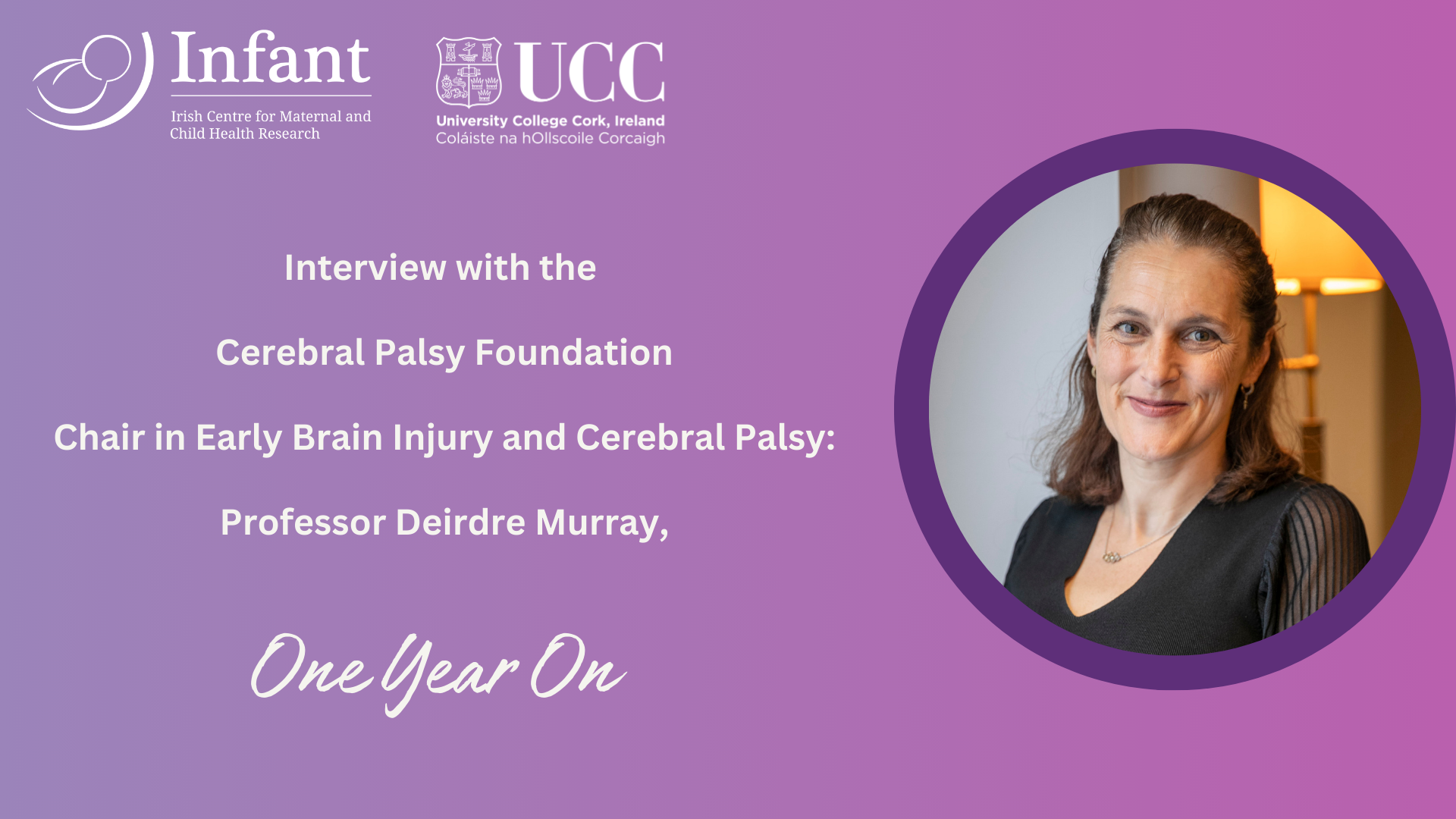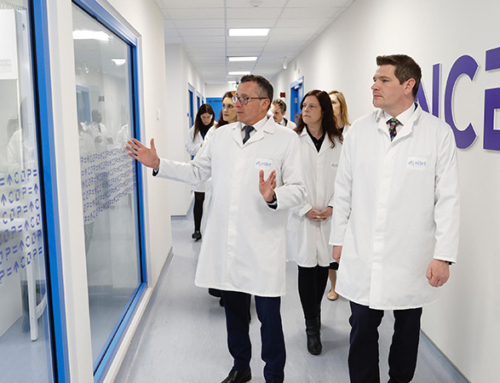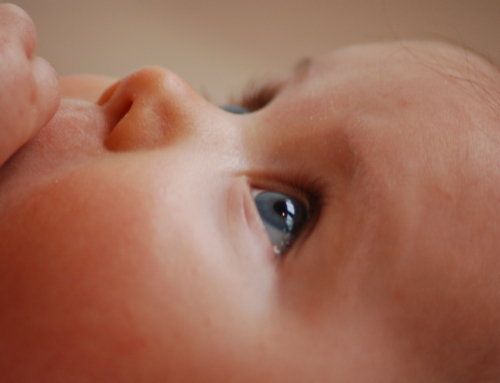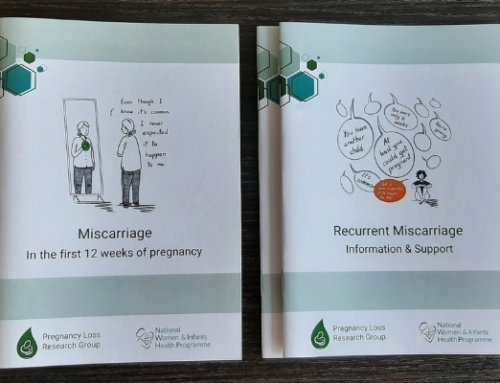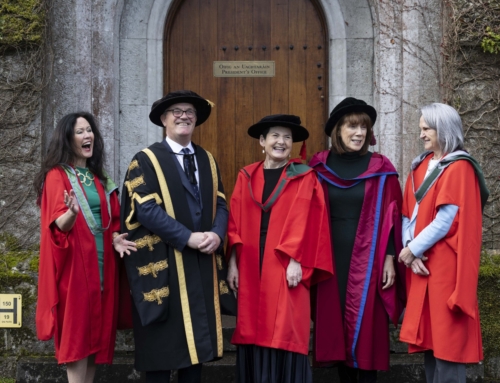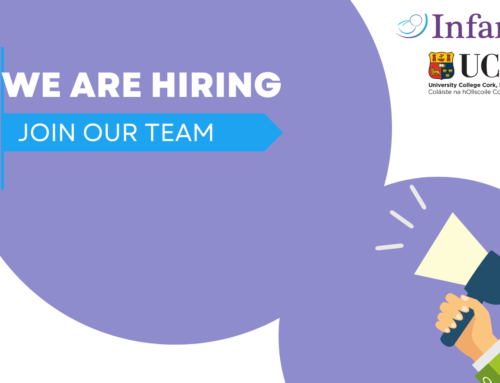On World Cerebral Palsy Day, October 6th, 2023, University College Cork (UCC) proudly announced the appointment of Professor Deirdre Murray as the Cerebral Palsy Foundation Chair in Early Brain Injury and Cerebral Palsy, marking the start of a transformative programme aimed at revolutionising cerebral palsy care in Ireland.
A UCC alumna, Professor Murray graduated in 1995 before completing paediatric training in Paediatric Intensive Care Medicine at Bristol Royal Hospital for Sick Children. Her journey continued as a Paediatric Intensive Care Fellow at the Royal Children’s Hospital in Melbourne. In 2012, she was awarded the prestigious Health Research Board Clinician Scientist Award for the BiHiVE study, which focuses on discovering biomarkers for neonatal brain injury.
Fast forward to World Cerebral Palsy Day, October 6th, 2024: We sit down with Professor Murray to reflect on her first year as Chair and the progress made.
Can you tell us more about your role as Chair (and your other roles) and the key areas of research you’re currently focusing on?
I am a consultant paediatrician in Cork University Hospital and I am also the Professor of Paediatrics in University College Cork. This means that I have time for research and teaching. My research has always been focused on trying to find better ways to predict and detect early brain injury. One year ago I was lucky enough to be funded by the Cerebral Palsy Foundation(CPF) to take up the role of Chair in Early Brain Injury and Cerebral Palsy. This allows me to really focus on this area of research which is very exciting. I feel privileged to be allowed to work on the area that I am most passionate about as I believe that this will allow us to make major steps forward in the prediction, detection and treatment of Cerebral Palsy (CP).
Looking back on your first year, what are some of the key highlights, milestones, or breakthroughs that stand out?
Last summer myself and the team at the INFANT centre worked on a proposal to Science Foundation Ireland for a Strategic Partnership Programme of research in Cerebral Palsy. This was co-funded by the Cerebral Palsy Foundation. Soon after taking up the post in October last year we heard that the proposal was successful and that SFI had agreed to match the donation that we received from CPF to fund this very ambitious programme of research which we called the ELEVATE programme. Over the next 5 years the team at INFANT, and researchers in TCD and RCSI will work on improving our ability to predict, prevent, detect and treat early brain injury and cerebral palsy.
Another highlight was launching the programme in March 2024, in particular because as part of the launch we held a Townhall meeting here in Cork where we got to meet with many of the parents and families affected by CP. This always gives us motivation to keep going and work hard to try to solve problems for these families.
This research will have a profound impact on children and their families. Can you share how the work is already making a difference?
I am part of a team that is delivering an early detection pathway for high-risk infants. All high risk children born in the four largest maternity hospitals are now examined carefully before they go home from the Neonatal units, and again at 3 months, 9 months and 24 months of age. The aim is to dramatically reduce the age at which children are diagnosed with CP to less than 12 months and ideally 9 months. This will allow us to enroll these children in trials of very early focused interventions which we hope will improve long term mobility and outcome. We will be providing access to expert information and guidance and are currently developing educational materials for the families. We have a parent advisory group, built from all over Ireland with parents of children with CP who have kindly given up their time to help and have guided us every step of the way.
Last year I was invited to take part in a Global consortium called CP360. This alliance involves researchers and families from all over the world who are working together to improve care for people with CP. Within this consortium I am working as part of a group to develop a universal screener for cerebral palsy that can be scaled and used anywhere in the world. We hope that in the near future it will be possible for parents or caregivers to send short videos of their infants to a large and secure database which will anonymously and automatically identify those children at risk of CP to detect and diagnose the 1-2 per 1000 children who have CP as early as possible.
This will be a game-changer for early intervention.
What have been the biggest challenges you’ve faced in this role?
It has to be time. We are so impatient to make progress, but the care for people with CP in Ireland is currently so fragmented that it is hard to know where to start. Our focus is on research from 0-3 years, in particular on prediction and early detection. We need to get this sorted first, and then build on that by building expertise in early intervention. Families are crying out for interventions for older children, but we have to focus on the area where we have expertise and do this one step at a time. That is hard and I wish every day that I could do more.
You work with a multidisciplinary team and collaborate with partners globally. How do these partnerships strengthen progress in early brain injury and cerebral palsy research?
As part of the ELEVATE programme we will work with collaborators in Sweden, Italy, USA as well as our co-investigators in Dublin. We have long established collaborations with many researchers all over the world, all with the focus of improving the care of the newborn brain and preventing, detecting and treating early brain injury. This helps us to ensure that our research is cutting edge and that we are bringing the latest methods and ideas back to our centre to keep pushing things forward to improve care.
How important is the input from patients and families, and how have you integrated their perspectives into the research over the past year?
It is integral. We are very aware that parents are the ones that know the most important research questions. Our Parent Advisory Group give their time to review all of our documents, our protocols and plans to ensure that the aims make sense for families.
They have also helped to guide us on our parent educational materials. We asked them “What do you wish someone had told you when you first received the diagnosis of CP for your child?” “What way would you have liked the material delivered to you and by who?” “What topics, how detailed, etc?”. This information is vital for us as we need to get this right.
Looking ahead, what are your key priorities for the coming year and beyond as you continue in this role?
I am working with the CPF and my colleagues in Dublin, Dr Jennifer Ryan and Prof Denise McDonald to bring attention to the needs of children and adults with CP in Ireland; pushing to try to develop clinical care pathways for the time beyond the first 3 years of life. The injury that causes CP occurs once but the ongoing difficulties faced by these children progress as they get older, and their needs often become greater.
Unfortunately, at the moment in Ireland the support needed for many of these steps is missing or fragmented and care depends on where you live and what the local team can offer. Access to high quality care should be equitable for all children no matter where they live. A national clinical programme of care for CP would help us move towards that goal.
In the INFANT centre we are building the ELEVATE team and hope to start recruiting infants to the study within the next few weeks. We are working with our Swedish collaborators to access large amounts of pregnancy and birth data from Sweden to develop automated risk algorithms using this data to identify babies most at risk of CP at the time of birth. We are looking at what proteins might be measurable in blood tests soon after birth to detect brain injury. We will also be looking at brain waves measured using EEG at 3-4 months of age to see what clues they can give us about brain insults and outcome.
Next we will be looking at better ways of assessing young children with brain injury to predict co-existing learning difficulties. Standard ways of assessing children with brain injury are very difficult it they have visual problems, or movement difficulties. We are developing ways to work around this to give us a true picture of the child’s learning potential.
I am impatient to get started and looking forward to what the next four years will bring.


